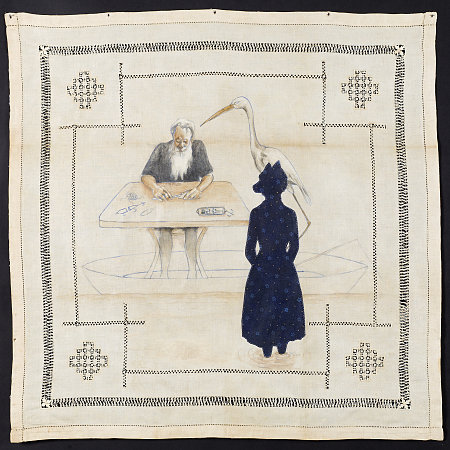
A Collaboration
You and I stop for a second to discuss what exactly about Zungvilda is so compelling to Goombeldt. Is he a lazy individual, someone who finds it easier to preserve the status quo instead of exerting an effort to look for a more suitable partner? Is he insecure about his prospects? The skin rash that often affects him under stress makes him feel unattractive, repulsive. Zungvilda claims that it doesn’t bother her, but with these bloated red hives, Goombeldt doesn’t have the heart to believe her.
It’s true: Zungvilda is one of those irresistible stars who draw the affection of everyone they encounter without a slightest effort on their part. Yes, she is beautiful, quite charming, but is that enough? She is equally comfortable discussing dialogic philosophy and Moroccan cuisine, but does that guarantee harmony? Their silences are comfortable—in fact, they are among the most harmonious in the history of verbal communication—but are silences the answer to everything? Goombeldt can pretend their relationship is based on equality, but he knows perfectly well that it’s an illusion. Zungvilda is aware of this too, although she never overtly challenges the perception of a fair balance.
They are equal in the rules they have agreed upon, but not in the ways they follow them, nor in what these rules mean to either. And when Zungvilda looks at him, Goombeldt feels as if her stare is not there at all. Like a beam of light, it pierces the interstellar distances between them and escapes forever into the far reaches of the universe.
Now we are getting into it. I’ve been typing so far; I suggest you take over. Goombeldt’s reality is being crafted by your nimble fingers. He is accustomed to surrendering his time on nights like this, giving up his attempts to get anything done. But now it occurs to him, plainly and with a gigantic question mark: Why? Why should he be this way? He could develop tools for dealing with a situation without losing himself to it, without surrendering his productivity and peace of mind. He could discipline himself into ignoring Zungvilda’s inconsistencies. And to prove that this is not just a momentary whim but a true plan, he will start tonight!
How?
The question is immediate, its effect disheartening. But Goombeldt is not deterred. He will dedicate himself to some activity that will occupy his mind. You and I try to think of a good choice. It could be a movie, a walk, a meditation. Strangely enough, Goombeldt is going through the same list of options. He settles on a walk, granting us the widest range of opportunities for plot development.
While he covers his first few blocks—warming up, his gait slow at first, then faster, more athletic—you and I have tea. I’m on a diet; I have no choice but to decline the cookies, even if I brought them along. You can’t seem to stop munching on them, not realizing that a small crumb is stuck on your chin. Goombeldt is surprised to see how few people are out at this hour. What hour is it? He hasn’t been out this late in years. It’s spooky how empty the streets are, how dark. Could he go somewhere instead of just walking around? A bar? That would be clichéd. A movie? He has already considered it—besides, movie theaters must have already gone to sleep.
It’s clear enough to Goombeldt: Reacting to Zungvilda’s disappearance by simply taking a walk still means surrendering his time needlessly, letting her get away with another theft. Unless this walk manages to become significant in his life. What would make it so?
